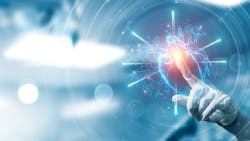Is artificial intelligence better at assessing heart health?
Who can assess and diagnose cardiac function best after reading an echocardiogram: artificial intelligence (AI) or a sonographer?
According to Cedars-Sinai investigators and their research published in the peer-reviewed journal Nature, AI proved superior in assessing and diagnosing cardiac function when compared with echocardiogram assessments made by sonographers.
The findings are based on a blinded, randomized clinical trial of AI in cardiology led by investigators in the Smidt Heart Institute and the Division of Artificial Intelligence in Medicine at Cedars-Sinai.
In 2020, researchers at the Smidt Heart Institute and Stanford University developed one of the first AI technologies to assess cardiac function, specifically, left ventricular ejection fraction—the key heart measurement used in diagnosing cardiac function. Their research also was published in Nature.
Building on those findings, the new study assessed whether AI was more accurate in evaluating 3,495 transthoracic echocardiogram studies by comparing initial assessment by AI or by a sonographer—also known as an ultrasound technician.
Among the findings:
- Cardiologists more frequently agreed with the AI initial assessment and made corrections to only 16.8% of the initial assessments made by AI.
- Cardiologists made corrections to 27.2% of the initial assessments made by the sonographers.
- The physicians were unable to tell which assessments were made by AI and which were made by sonographers.
- The AI assistance saved cardiologists and sonographers time.

